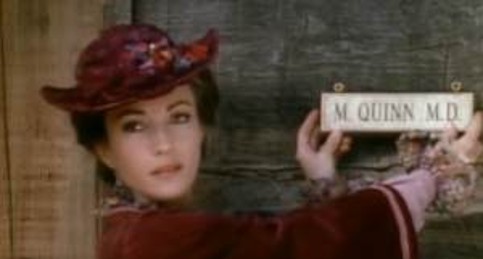

Dr Quinn, Medicine Woman is an American series, that aired between 1993 and 1998 on CBS, for a total of 6 seasons and 149 episodes. The main character, Michaela Quinn, is played by Jane Seymour. The story takes place in 1867, in a small town in Colorado as a wealthy young woman, Michaela Quinn, arrives from Boston to work there as a physician and has to adapt to her new life.
In the mid-19th century, to be an educated woman and a physician was rare but not fictional. For example, Elizabeth Blackwell was the first woman to receive a medical degree in the United States of America after she graduated in 1849 from Hobart and William Smith Colleges in New York. Access to education for women significantly increased in the United States as, in the mid-19th century, many colleges for women opened across the country. This followed the Convention of Seneca Falls in July 1848, the first American convention for women’s rights, authorising them to access a college education. The creation of colleges permitted women to work in science, such as medicine, chemistry, or civil engineering. In 1850, two years after the Convention, the first medical school for women in the United States was created: The Woman’s Medical College of Pennsylvania.
The character of Michaela Quinn evolved during this period when women began to access medical studies in the United States. Throughout the series, Michaela had to face issues concerning her status as a physician. In almost every episode, her ability to heal the inhabitants of Colorado Spring is questioned, mainly because she is a woman. Although, the private and professional aspects of her life demonstrated certain independence from the period she was evolving in.
The series was produced in the 90s by Beth Sullivan. This context is important to understand because of the link between the series and feminist movements. We can cite the ethics of care, demonstrated by the research of Carol Gilligan in 1982, in the United States. She created the notion of “care” or attentiveness, which is considered natural for women because they are thought of as caregiving, and attentive due to their maternal nature.
The character of Michaela Quinn, as she was portrayed in the series, fits this category of an innate carer, even though she is a certified physician and recognized by her peers. From the beginning, Quinn is seen as a maternal figure because she was raising three adopted children. She is also perceived as more empathic and receptive to her patients’ emotions, and particularly in episodes she had to face her male colleagues, we can notice the gender-based differences. Men are portrayed as distant physicians, thinking with their minds rather than their hearts, as opposed to Michaela who is empathic and treating her patients as human beings and not just bodies.
However, this vision should be nuanced because Michael Quinn is portrayed as a thoughtful, smart, and educated woman. Despite the disagreements, the inhabitants of Colorado Spring all went to consult, to get treatment and advice from her. For example, during the fifth episode of the first season, one of the residents was injured and consulted the barber-surgeon instead of Dr Quinn. The latter took this opportunity to criticize Michaela, saying: “Would you rather it be this woman ?” when the patient didn’t want to be auscultated.
The doctor wasn’t liked by every inhabitant, and it could be seen during surgeries because they all were at her window and took bets on whether she could save the patient or not. During the surgery, Jake Slicker assisted her and tried to dissuade the patient, telling him: “you can’t let her do that”. However, he fainted at the sight of blood and Michaela finished the surgery alone.
Even though the character of Michaela portrayed the image of a caregiver, representative of the ethics of care of the 90s, she was nonetheless a strong, courageous and rational woman. Michaela Quinn was an independent female character, who built herself in a patriarchal world.
Read more in the dictionary: Officiers de santé
Read the paper in French :Dr Quinn
Références :
Carol Gilligan, Le care, éthique féminine ou éthique féministe ?, Multitudes, 2009/2-3, n°37-38, p.76 - 78.
Mathieu Touzil-Divin, Idées politiques & séries télévisées – actes du colloque réalisé dans le cadre des "24 heures du droit" à Le Mans (16 décembre 2011), Presse Universitaires juridique, coll. Faculté de droit et des Sciences sociales (Poitiers), 2013.
To quote this paper : Emma Lalouze, "Dr Quinn", in Hervé Guillemain (ed.), DicoPolHiS, Le Mans Université, 2022.